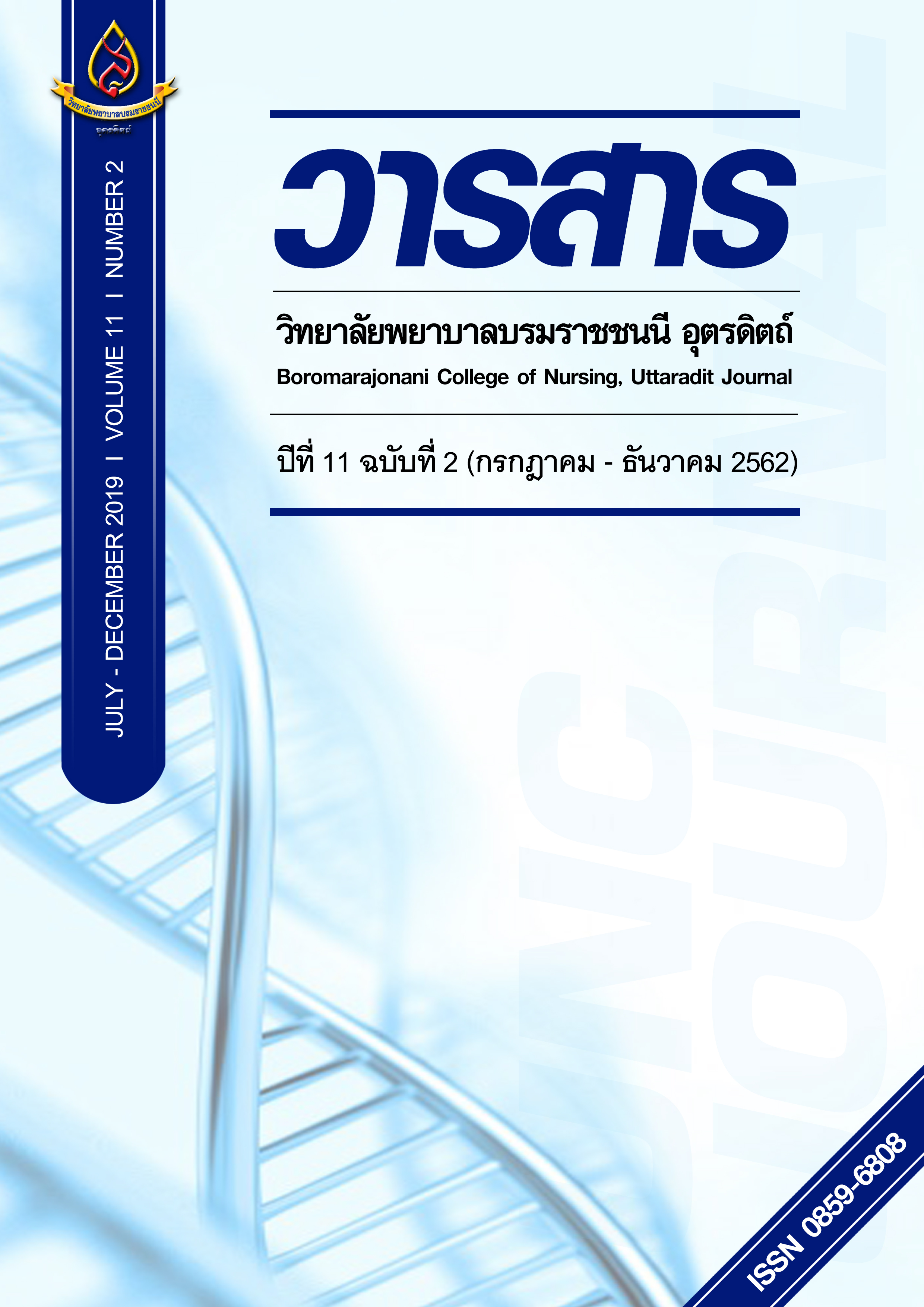ปัจจัยทำนายความเครียดในญาติผู้ดูแลผู้ป่วยโรคหลอดเลือดสมองในชุมชนที่เลือกสรร
Main Article Content
บทคัดย่อ
การศึกษาความสัมพันธ์เชิงทำนายมีวัตถุประสงค์เพื่อศึกษาปัจจัยทำนายความเครียดในญาติผู้ดูแลผู้ป่วยโรคหลอดเลือดสมองบนพื้นฐานแนวคิดระบบนิเวศวิทยา กลุ่มตัวอย่างคือ ญาติผู้ดูแลหลักที่ดูแลผู้ป่วยโรคหลอดเลือดสมอง ถูกเลือกแบบการสุ่มแบบแบ่งชั้นตามเกณฑ์คัดเข้า จำนวน 99 ราย เก็บข้อมูลโดยใช้แบบสอบถามการรับรู้สมรรถนะตนเอง แบบประเมินความสามารถในการประกอบกิจวัตรประจำวัน แบบสอบถามสัมพันธภาพระหว่างผู้ป่วย ญาติผู้ดูแล และครอบครัว แบบสอบถามแรงสนับสนุนทางสังคม แบบประเมินความเครียดของผู้ดูแล และแบบสอบถามความเชื่อเกี่ยวกับการเจ็บป่วย วิเคราะห์ข้อมูลโดยสถิติบรรยาย และสถิติการวิเคราะห์การถดถอยเชิงเส้นแบบพหุคูณ
ผลการศึกษา พบว่า ระยะเวลาที่ดูแลผู้ป่วยมีความสัมพันธ์ทางบวกกับความเครียดในญาติผู้ดูแลอย่างมีนัยสำคัญทางสถิติ (r = .30, p <.05) การรับรู้สมรรถนะตนเอง สัมพันธภาพระหว่างผู้ป่วย ญาติผู้ดูแลและครอบครัว ความเชื่อเกี่ยวกับการเจ็บป่วย มีความสัมพันธ์ทางลบกับความเครียดในญาติผู้ดูแลอย่างมีนัยสำคัญทางสถิติ (r=-.48, p<.01; r= -.37, p<.01; r = -.25, p<.05 ตามลำดับ) ระยะเวลาที่ดูแลผู้ป่วยและการรับรู้สมรรถนะตนเองสามารถร่วมทำนายความเครียดในญาติผู้ดูแลผู้ป่วยโรคหลอดเลือดสมองอย่างมีนัยสำคัญทางสถิติ (p<.05) ได้เท่ากับร้อยละ 27.4 (R2 adj = .26, F = 5.35) สมการถดถอยในรูปแบบคะแนนมาตรฐาน คือ Z ความเครียดในญาติผู้ดูแล = -.44 การรับรู้สมรรถนะตนเอง +.21 ระยะเวลาที่ดูแลผู้ป่วย ผลการศึกษาเสนอแนะว่า พยาบาลและบุคลากรสุขภาพควรจัดโปรแกรมที่เพิ่มสมรรถนะตนเองในการดูแลผู้ป่วยโรคหลอดเลือดสมองที่บ้านเพื่อลดความเครียดจากการดูแลผู้ป่วยโรคหลอดเลือดสมอง
Article Details
บทความหรือข้อคิดเห็นใดใดที่ปรากฏในวารสารวิจัยการพยาบาลและวิทยาศาสตร์สุขภาพ เป็นวรรณกรรมของผู้เขียน ซึ่งบรรณาธิการหรือสมาคมศิษย์เก่า ไม่จำเป็นต้องเห็นด้วย และบทความที่ได้รับการตีพิมพ์เผยแพร่ถือเป็นลิขสิทธิ์ของวารสารวิจัยการพยาบาลและวิทยาศาสตร์สุขภาพ
เอกสารอ้างอิง
2) Bureau of Non-Communicable Diseases, Department of Disease Control. (2017). Annual report 2017. Nonthaburi: The War Veterans Organization of Thailand Under Royal Patronage Of His Majesty The King (in Thai)
3) Donnelly N.A., Hickey A., Burns A., Murphy P. & Doyle F. (2015). Systematic review and meta-Analysis of the Impact of Carer Stress on Subsequent Institutionalisation of Community-Dwelling Older People. PLoS ONE 10(6), 1-19.
4) Gbiri, C.A., Olawalea, O.A. & Isaaca, O. (2015). Stroke management: Informal caregivers’ burdens and strains of caring for stroke survivors. Annals of Physical and Rehabilitation Medicine, 58(2), 98-103.
5) Gray, R. & Thapsuwan, S. (2014). Determinants of stress among family caregivers to older persons. Songklanakarin Journal of Social Sciences and Humanities, 20(1), 203-228. (in Thai)
6) Health Data Center. (2018). Rate of stroke. Accessible from https://bit.ly/2zYSEpp
7) Junpanit, A., Lawang, W., & Toonsiri, C. (2018). Factors Influencing The positive aspects of caregiving among stroke family caregivers. Journal of Nursing and Education, 11(2), 61-73. (in Thai)
8) Kim D. (2017). Relationships between caregiving stress, depression, and self-Esteem in family caregivers of adults with a disability. Occupational therapy international, 2017,1686143
9) Mayr S., Erdfelder E., Buchner A., & Faul F. (2007). A short tutorial of G*Power. Tutorials in Quantitative Methods for Psychology, 3(2), 51-59.
10) Pesantes, M.A., Brandt, L.R., Ipince, A., Miranda, J.J. & Diez-Canseco, F. (2017). An exploration into caring for a stroke-survivor in Lima, Peru: Emotional impact, stress factors, coping mechanisms and unmet needs of informal caregivers. eNeurologicalSci, 6, 33-50.
11) Prombut, P., Piaseu, N., & Sakulhongsopon, S. (2014). Factors related to stress of Family caregiver of patients with stroke at home. Ramathibodi Nursing Journal, 20(1), 82-96. (in Thai)
12) Sakunhongsophon, S., Sirapo-ngam, Y., Tripp-Reimer, T., & Junda, T. (2011). Stroke caregiving networks in Bangkok: patterns of social exchange behavior. Pacific Rim International Journal of Nursing Research, 15(2), 152-165
13) Salini, P., Conjeevaram, J., & Munisusmitha, K. (2017). Female caregivers and stroke severity determines caregiver stress in stroke patients. Annals of Indian Academy of Neurology, 20(4), 418-424.
14) Thuenyang, T., (2011). Factors influencing health promoting behaviours among family caregivers of stroke patients. (Master’s thesis) Burapha University, Chonburi. (in Thai)
15) World Health Organization. (2014). Global status report on noncommunicable diseases 2014. Switzerland: World Health Organization.


